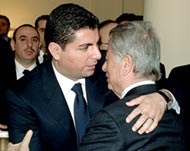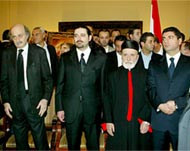Grief-stricken Lebanese point fingers
Anti-Syrian sentiments are running higher than ever in Lebanon, with many people pointing accusing fingers at Syria forMonday’s assassination of former prime minister Rafiq al-Hariri.

The seafront location in Beirut has become a pilgrimage to curious visitors who want to see where the man, who is perceived by many as the one who breathed new life into the country, lost his own.
Workers are still clearing up the debris there as neighbouring five-star hotels, banks and other businesses begin to replace shattered windows and repair damaged facades.
“It is the Syrians who killed him,” said Abu Ali Adil, 42, as he walked away from the scene of the blast at Beirut’s classy sea front.
The trip from the scene of the blast to al-Hariri’s mansion in Quraitim took only a few minutes as there were hardly any cars moving on the streets. A visibly grief-stricken country has plunged into three days of mourning.
The only sound breaking the silence was the reciting of Quranic verses coming from the capital’s mosques.
Public distrust
Upon arriving at al-Hariri’s mansion, journalists had to go through the routine search by security guards before entering the palace, which was crowded with ordinary people and politicians.
The general feeling again was that Syrian and Lebanese authorities were behind the assassination. Syria dominates its smaller neighbour both politically and militarily.
 |
|
Al-Hariri’s son receives Syria’s |
“The Syrian and Lebanese forces are the only ones in charge of security in the country,” said Serge Tour Sarkissian. “And therefore the responsibility lies on those who are handling security. Neither the United States nor France nor other countries have security presence here.”
“Nothing will come out of the investigations,” said another man upon hearing about Lebanese Interior Minister Sulaiman Franjiya’s statements on Tuesday afternoon that initial investigations into al-Hariri’s assassination showed the car bomb was detonated by a suicide attacker.
In many cases of assassinations of prominent Lebanese politicians and judges, nobody has been tried or has been held responsible for the deaths. And the people have little confidence in their authorities.
Others scorned the claim of responsibility of al-Hariri’s death by a previously unknown Islamist group, saying it was to cover Syria’s actions. “I’m not scared of getting locked up in prison. It is the Syrians who did it. Let them get out of here,” yelled Fatima Hassania, a woman of 50 years.
Outspoken comments
It is new for ordinary Lebanese Muslims to pass such outspoken comments against Syria without the fear of being punished. Previously, intense hostility towards Syria was mainly felt by and associated with Christian opposition groups.
But the killing of al-Hariri, who commanded wide popularity in Lebanon, especially Sunnis, has sharply provoked people to identify themselves with or against Syria.
 |
|
Jumblatt (L) said al-Hariri’s death |
Since the Lebanese parliament bowed to Syrian wishes and amended the constitution to allow President Emile Lahud to extend his term for another three years, al-Hariri had been slowly shifting his position closer to that of the opposition.
Druze leader Walid Jumblatt, who was paying his condolences to al-Hariri’s family on Tuesday, told Aljazeera.net that the tragic death of al-Hariri could lead to a major transformation of the country. “Either the killing of Hariri or anybody else will and has to change the course of history, but we cannot stay hostages of a police state.”
None the less, the killing of such a high-profile and powerful figure with strong Arab and international ties has made many people scared of what will happen next. “Where is the country heading to?” asked Fatin Abu Zainab, whose husband works at one of al-Hariri’s companies.
Black flags
In the afternoon, protesters standing outside al-Hariri’s palace were heard chanting: “There is no God but Allah and Syria is the enemy of Allah.” Then, cars with young men honking horns, holding al-Hariri’s pictures and waving black flags poured into the streets until there was such a traffic jam that cars could not move.
A young man riding a motorcycle and following the noisy cars said that with the death of al-Hariri, many people were going to lose their jobs. “He used to create job opportunities for the people. He never abandoned us,” said the man who identified himself as 19-year-old Ibrahim Salih.
 |
|
Protesters hold posters in Sidon, |
Nada Ghalayini, 25, named the Syrian government, which she blamed for al-Hariri’s death, “the second Saddam Hussein”, referring to the former president of Iraq who was ousted by US-led forces in April 2003.
She said she would start looking for ways to get out of the country now that al-Hariri was dead. “He was the hope of Lebanon,” Ghalayini said, her eyes red from weeping.
“This was the death not just of Hariri but of Lebanon. He made Lebanon. Now we’ve been set back 20 years,” she added referring to his efforts in rebuilding Beirut after the end of the civil war.
“There will be no peace, no hope for the future.”